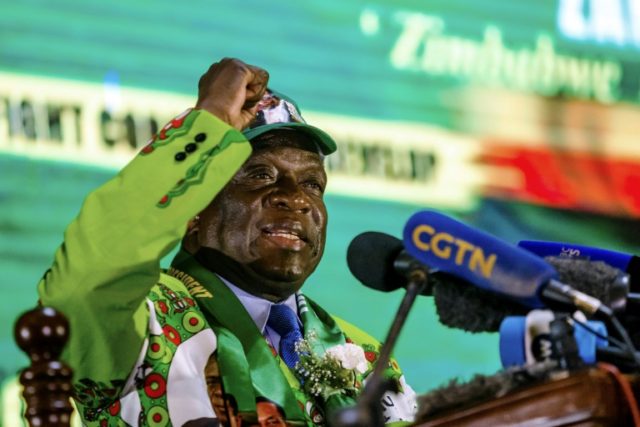Zimbabwe’s interim President Emmerson “the Crocodile” Mnangagwa announced on Wednesday that elections will be held on Monday, July 30 for both the presidency and legislature. It will be the first time in four decades an election has been held without dictator Robert Mugabe on the ballot.
Mnangagwa further announced that if none of the presidential candidates wins the necessary majority, a runoff will be held on September 8. Voter registration for the 2018 election began in October and will end on Friday, June 1. The European Union agreed to provide observers for the election this week.
Mnangagwa, who was once Darth Vader to Mugabe’s empire, succeeded the nonagenarian dictator after he was deposed in a memorably bizarre coup last November. Zimbabwe does not have a tradition of clean and vibrant elections, but Mnangagwa promised the elections will be “free, fair, and transparent” this time, and “the voice of the people will be heard.”
Mnangagwa has a strong incentive to play fair, as he has been attempting to revive Zimbabwe’s disastrous economy after years of corrupt pillaging and crackpot Marxist theories, and fair elections are a necessary step for relieving American and European sanctions imposed against the Mugabe dictatorship.
“Zimbabwean manufacturers, traders and tourism operators will rejoice if the EU’s presence at the polls proves to be the first step towards extending a political olive branch,” director Charles Laurie of the Verisk Maplecroft analytics firm told CNBC on Tuesday.
“An endorsement of the election’s legitimacy from Brussels is a critical next step for major Western investors to set aside their doubts over whether the country is ‘open for business,’” Laurie added. The reverse is presumably true, so if Mnangagwa’s government is caught rigging the election, Zimbabwe’s effort to emerge from Mugabe’s corrupt shadow and present itself as safe for foreign investment will end in disaster.
Mnangagwa strove to distinguish himself from the corrupt Mugabe clan with amusing bluntness last weekend by publicly instructing his wife not to be like Mugabe’s wife Grace, who is reviled in Zimbabwe for plundering the country to finance her lavish lifestyle. At a fundraising dinner in Harare on Saturday, Mnangagwa advised Mrs. Crocodile to stay out of politics, mindful that Grace Mugabe’s ascension to Robert Mugabe’s heir apparent was one of the major factors driving the coup against him.
The Zimbabwe Mail nevertheless described the opposition as “jittery” on Wednesday. The opposition Movement for Democratic Change (MDC) party claimed it has “noticed some anomalies” in the voter rolls and called for an independent audit.
The Wall Street Journal scores MDC leader Nelson Chamisa, 40, as the strongest challenger to 75-year-old Mnangagwa and sees his party scoring points against Mnangagwa and his long-dominant Zanu-PF party over the tottering economy and Mugabe’s legacy. However, the MDC is “weakened by the death of its longtime leader Morgan Tsvangirai in February and a divisive internal battle over who should succeed him.”
More disturbingly, some observers believe the Zimbabwean military will refuse to recognize an election that knocks Zanu-PF and their chosen man Mnangagwa out of power. Deputy Finance Minister Terence Mkupe said as much at a Zanu-PF rally last week: “We cannot say, honestly, the army took the country, practically seized the country from Mugabe, so that they can hand it over to Chamisa.”
The Mnangagwa government officially disavowed Mkupe’s statement and said it has no plans to overturn the election if Chamisa wins.

COMMENTS
Please let us know if you're having issues with commenting.